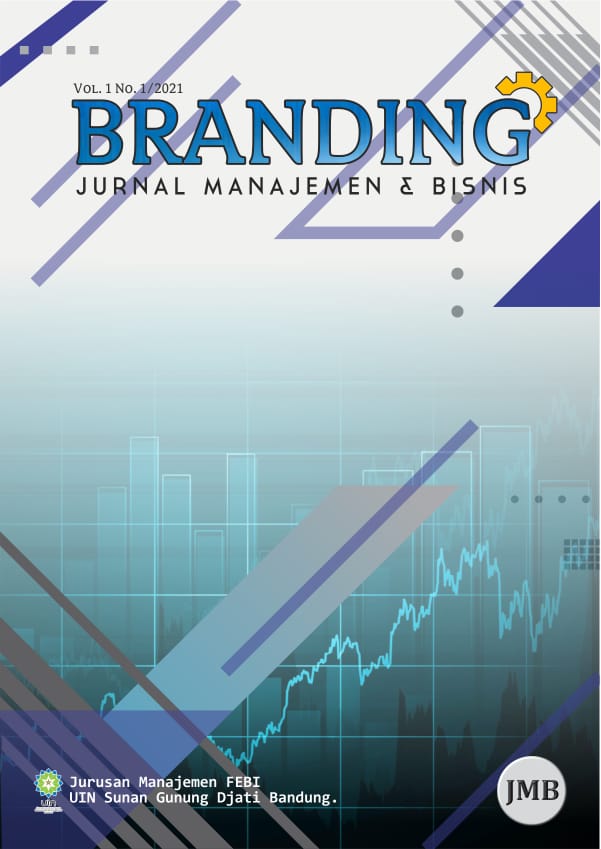SMART OPERATIONS: IMPLEMENTING AI-DRIVEN TECHNOLOGIES FOR ENHANCED EFFICIENCY IN SUPPLY CHAIN MANAGEMENT
DOI:
https://doi.org/10.15575/jb.v3i1.35118Keywords:
Artificial Intelligence, Supply Chain Management, Logistics.Abstract
Supply chain management is a vital element in a company's overall operations, but is faced with complex challenges such as fluctuations in market demand, logistical complexity, resource limitations, and the risk of disruption. This research aims to explore the role of artificial intelligence (AI)-based technology in overcoming these challenges. This research will be carried out using a qualitative approach, collecting data from various relevant sources and then analyzing it systematically. Through this approach, this research aims to gain a deep understanding of the long-term impact of applying AI to the supply chain, including improving operational efficiency, competitive advantage, supporting sustainability, and the evolution of the human role. The research results show that AI makes a significant contribution to improving companies' operational efficiency, providing competitive advantage through enhanced responsiveness, supporting more sustainable business practices, and enabling the evolution of the role of humans in the supply chain. The practical implication of this research is that the application of AI technology can help companies achieve better performance and prepare for future challenges in an increasingly complex and dynamic business environment.
References
Ahmad, T., Zhang, D., Huang, C., Zhang, H., Dai, N., Song, Y., & Chen, H. (2021). Artificial intelligence in sustainable energy industry: Status Quo, challenges and opportunities. Journal of Cleaner Production, 289, 125834.
Al-Surmi, A., Bashiri, M., & Koliousis, I. (2022). AI based decision making: combining strategies to improve operational performance. International Journal of Production Research, 60(14), 4464-4486.
Antonopoulos, I., Robu, V., Couraud, B., Kirli, D., Norbu, S., Kiprakis, A., ... & Wattam, S. (2020). Artificial intelligence and machine learning approaches to energy demand-side response: A systematic review. Renewable and Sustainable Energy Reviews, 130, 109899.
Bishop, J. M. (2021). Artificial intelligence is stupid and causal reasoning will not fix it. Frontiers in Psychology, 11, 513474.
Chen, J., Ramanathan, L., & Alazab, M. (2021). Holistic big data integrated artificial intelligent modeling to improve privacy and security in data management of smart cities. Microprocessors and Microsystems, 81, 103722.
Dauvergne, P. (2022). Is artificial intelligence greening global supply chains? Exposing the political economy of environmental costs. Review of International Political Economy, 29(3), 696-718.
Fanoro, M., Božanić, M., & Sinha, S. (2021). A review of 4IR/5IR enabling technologies and their linkage to manufacturing supply chain. Technologies, 9(4), 77.
Farsi, M., Latsou, C., Erkoyuncu, J. A., & Morris, G. (2020). Rfid application in a multi-agent cyber physical manufacturing system. Journal of Manufacturing and Materials Processing, 4(4), 103.
Hasan, A. R. (2021). Artificial Intelligence (AI) in accounting & auditing: A Literature review. Open Journal of Business and Management, 10(1), 440-465.
Hassani, H., Silva, E. S., Unger, S., TajMazinani, M., & Mac Feely, S. (2020). Artificial intelligence (AI) or intelligence augmentation (IA): what is the future?. Ai, 1(2), 8.
Lehmann, J., Lober, A., Häußermann, T., Rache, A., Ollinger, L., Baumgärtel, H., & Reichwald, J. (2023). The anatomy of the internet of digital twins: A symbiosis of agent and digital twin paradigms enhancing resilience (not only) in manufacturing environments. Machines, 11(5), 504.
Moshood, T. D., Nawanir, G., Mahmud, F., Sorooshian, S., & Adeleke, A. Q. (2021). Green and low carbon matters: A systematic review of the past, today, and future on sustainability supply chain management practices among manufacturing industry. Cleaner Engineering and Technology, 4, 100144.
Nasereddin, A. (2024). A comprehensive survey of contemporary supply chain management practices in charting the digital age revolution. Uncertain Supply Chain Management, 12(2), 1331-1352.
Nozari, H., Szmelter-Jarosz, A., & Ghahremani-Nahr, J. (2022). Analysis of the challenges of artificial intelligence of things (AIoT) for the smart supply chain (case study: FMCG industries). Sensors, 22(8), 2931.
Nunes, L. J. R., Causer, T. P., & Ciolkosz, D. (2020). Biomass for energy: A review on supply chain management models. Renewable and Sustainable Energy Reviews, 120, 109658.
Ozmen Garibay, O., Winslow, B., Andolina, S., Antona, M., Bodenschatz, A., Coursaris, C., ... & Xu, W. (2023). Six human-centered artificial intelligence grand challenges. International Journal of Human–Computer Interaction, 39(3), 391-437.
Pournader, M., Ghaderi, H., Hassanzadegan, A., & Fahimnia, B. (2021). Artificial intelligence applications in supply chain management. International Journal of Production Economics, 241, 108250.
Putra, A., Tarigan, Z. J. H., & Siagian, H. (2020). Influence of information quality on retailer satisfaction through supply chain flexibility and supplier relationship management in the retail industry. Jurnal Teknik Industri, 22(2), 93-102.
Reim, W., Åström, J., & Eriksson, O. (2020). Implementation of artificial intelligence (AI): a roadmap for business model innovation. Ai, 1(2), 11.
Sari, I. N., Lestari, L. P., Kusuma, D. W., Mafulah, S., Brata, D. P. N., Iffah, J. D. N., ... & Sulistiana, D. (2022). Metode penelitian kualitatif. Unisma Press.
Sazvar, Z., Zokaee, M., Tavakkoli-Moghaddam, R., Salari, S. A. S., & Nayeri, S. (2022). Designing a sustainable closed-loop pharmaceutical supply chain in a competitive market considering demand uncertainty, manufacturer’s brand and waste management. Annals of Operations Research, 1-32.
Sharma, R., Shishodia, A., Gunasekaran, A., Min, H., & Munim, Z. H. (2022). The role of artificial intelligence in supply chain management: mapping the territory. International Journal of Production Research, 60(24), 7527-7550.
Sodhi, M. S., & Tang, C. S. (2021). Supply chain management for extreme conditions: Research opportunities. Journal of Supply Chain Management, 57(1), 7-16.
Son, B. G., Chae, S., & Kocabasoglu-Hillmer, C. (2021). Catastrophic supply chain disruptions and supply network changes: a study of the 2011 Japanese earthquake. International Journal of Operations & Production Management, 41(6), 781-804.
Yang, Y., Zhuang, Y., & Pan, Y. (2021). Multiple knowledge representation for big data artificial intelligence: framework, applications, and case studies. Frontiers of Information Technology & Electronic Engineering, 22(12), 1551-1558.
Downloads
Published
How to Cite
Issue
Section
Citation Check
License

This work is licensed under a Creative Commons Attribution-ShareAlike 4.0 International License.
















